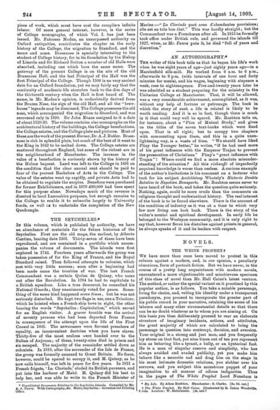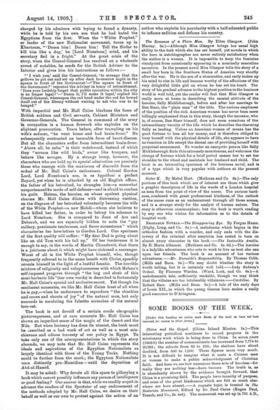NO THE WHITE PROPHET4
Wn have more than once been moved to protest in this column against a modern, and, in our opinion, a peculiarly obnoxious, form of portrait fiction. But we have never, in the course of a pretty long acquaintance with modern novels, encountered a more objectionable and mischievous specimen of this class of novel than Mr. Hall Caine's latest venture. The method, or rather the special variant on it practised by this popular author, is as follows. You take a notable personage, living for choice, and, veiling his identity under a transparent pseudonym, you proceed to incorporate the greater part of his public record in your narrative, retaining the scene of his labours and many other circumstantial details so that there can be no doubt whatever as to whom you are aiming at. On this basis you then deliberately proceed to rear an elaborate structure of imaginary incidents, actions, and attributes, the great majority of which are calculated to bring the personage in question into contempt, derision, and aversion. Your original is a strong and just man, and you frequently lay stress on that fact, yet nine times out of ten you represent him as behaving like a tyrant, a bully, or an hysterical fool. He is a man of . singular reserve and simplicity, who has always avoided and evaded publicity, yet you make him behave like a neurotic cad and drag him on the stage in his most intimate domestic relations, you slobber over his sorrows, and you subject this monstrous puppet of your imagination to all manner of odious indignities. Thus in the pages of The White Prcrphet Lord Nuneham is • My Life. By Adam Rushton. Manchester : S. Clarke. 95. net.] t nu, wads Prophet. By Hall Caine. Illustrated by B. Caton WoodvMe. 2 vols. London : W. Heinemann. Os. neLl
charged by his admirers with trying to found a dynasty, while he is told by his own son that he had hated the Egyptians from the first. When the "White Prophet," or leader of the new Nationalist movement, turns up in Khartoum, "'Damn him! Damn him! Tell the Sirdar to kill him like a dog,' he [Lord Nuneham] cried, and his secretary fled in a fright." At the great crisis of the story, when the Consul-General has resolved on a wholesale arrest of notables, he sends for the British Adviser to the Interior and gives him his instructions as follows :—
I wish you,' said the Consul-General, 'to arrange that the gallows be got out and set up after dark to-morrow night in the square in front of the Governorat.'—' The square in front of the Governorat ' repeated the Adviser in tones of astonishment. Does your lordship forget that public execution within the city is no longer legal ?'—' Damn it, I'll make it legal,' replied the Consul-General, whereupon the red head under the red fez bowed itself out of the library without waiting to ask who was to be hanged.'
With impartial zeal Mr. Hall Caine blackens the fame of
British soldiers and Civil servants, Cabinet Ministers and Governor-Generals. The General in command of the army in occupation is a human firework who explodes on the slightest provocation. Years before; after trampling on his
wife's seducer, "he went home and bad brain-fever." He subsequently contracted an incurable form of heart-disease. But all the characters suffer from intermittent brain-fever. "Above all, be calm" is their watchword, instead of which they "scream like wild birds," swear like troopers, and behave like savages. By a strange irony, however, the
characters who are held up to special admiration are precisely those who emerge with the maximum of discredit from the ordeal of Mr. Hall Caine's enthusiasm. Colonel Gordon Lord, Lord Nuneliam's son, is ex hypothesi a perfect Bayard, yet when he is attacked by an old English officer, the father of his betrothed, he strangles him—a somewhat unsportsmanlike mode of self-defence—and is afraid to confess his guilt. • Helena, the heroine, on whose opulent physical charms Mr. Hall Caine dilates with distressing unction,
on the disgrace of her betrothed voluntarily becomes the wife of the White Prophet—a new Mahdi—whoin she believes to have killed her father, in order to betray his schemes to Lord Nuneham. She is compared to Joan of Arc and Deborah, and we are especially bidden to note the "gay raillery, passionate tenderness, and fierce earnestness" which characterise her love-letters to Gordon Lord. One specimen of the first quality will suffice: "My dear Dad is going about like an old Tom with his tail up." Of her tenderness it is enough to say, in the words of Martin Chuzzlewit, that there is a juiciness about it which might have sickened a scavenger. Worst of all is the White Prophet himself, who, though frequently referred to in the same breath with Christ, speedily reveals himself in the light of a lustful fanatic. The horrible Mixture of religiosity and voluptuousness with which Helena's self-imposed progress through "the beg and slush of this Semi-barbaric life "(her own words) is described is fortunately
Mr. Hall Caine's special and exclusive secret. Yet though his sentiment nauseates, we like Mr. Hall Caine least of all when he is gay,—when he endeavours to reproduce "the chuckles and crows and shouts of joy ".of the natural man, but only succeeds in emulating the falsetto screeches of the natural tom-cat.
The book is not devoid of a certain crude oleagraphic picturesqueness, and at rare moments Mr. Hall Caine has shown an imperfect sense of the magic of the desert and the Nile. But when leniency has done its utmost, the book must be ,:escribed as a bad work of art as well as a most mis- chievous and odious travesty of our policy in Egypt. To take only one of the misrepresentations in which the story abounds, we may note that Mr. Hall Caine represents the ideals and aspirations of the Egyptian Nationalists as largely identical with those of the Young Turks. Nothing could be further from the mark ; the Egyptian Nationalists were distinctly pro - Hamidian— until the deposition of Abd-ul-Hamid.
It may be asked: Why devote all this space to pillorying; a book which cannot possibly influence any person of intelligence or good feeling ? Our answer is that, while we readily acquit in advance the readers of the Spectator of any endorsement of
the methods adopted by Mr. Hall Caine, we desire on their behalf as well as our own to protest against the action of an author who exploits his popularity with a half-educated public to inflame sedition and defame his country.







































 Previous page
Previous page